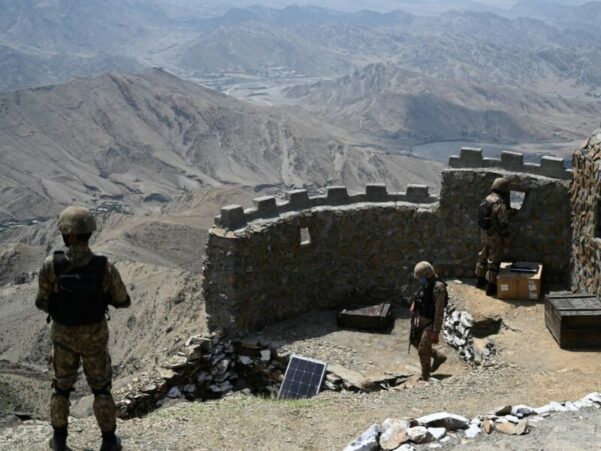
On the night of Saturday, October 12, 2025, a major skirmish broke out along the Afghanistan-Pakistan border when Afghan Taliban forces launched attacks on Pakistani border posts. This violent clash comes shortly after a series of explosions rocked Kabul earlier in the week, further intensifying the already strained relations between the two nations.
Taliban’s Accusations Against Pakistan
In the aftermath of the Kabul blasts, the Taliban’s Ministry of Defense released a statement accusing Pakistan of being responsible for the explosions, warning the Pakistani military to “face consequences” for their actions. Despite this sharp rhetoric, Pakistan has refrained from providing a clear response to the allegations.
According to Reuters, security officials from both Pakistan and Afghanistan confirmed the gunfights along the border on Saturday night. Pakistani security forces reported that they were responding forcefully to the unprovoked firing from the Afghan side. Pakistani officials mentioned that gunfire had been exchanged at over six locations along the border.
Taliban Claims Capture of Pakistani Border Posts
The Afghan Taliban forces claimed to have taken control of three Pakistani border posts. However, Pakistani security sources countered by stating that their forces had destroyed several Afghan posts in retaliation for the attacks.
While no official statement has yet been issued by Pakistan regarding the latest developments, their military has previously responded to the Taliban’s claims and statements. The situation remains highly volatile with both sides exchanging accusations and military actions.
Rising Tensions and International Reactions
As the conflict rages on, the international community has shown concern over the rising tensions between Afghanistan and Pakistan. Saudi Arabia and Qatar, two countries with significant influence in the region, have expressed deep concern about the ongoing clashes and have urged both sides to exercise restraint and seek a peaceful resolution to the conflict.
Saudi Arabia, through an official statement, emphasized the importance of diplomatic dialogue between Pakistan and Afghanistan. The statement called for both countries to prioritize regional stability and resolve the tensions through peaceful negotiations rather than further escalation.
Qatar has echoed similar sentiments, urging both Afghanistan and Pakistan to address the situation through dialogue and diplomacy. Qatar’s Ministry of Foreign Affairs called for both sides to work towards de-escalating the situation and to avoid any further military confrontations.
The Military Escalation Along the Border
Taliban forces reportedly launched attacks on Pakistani military checkpoints in eastern Afghanistan’s Kunar province, southeastern Khost, Paktia, and southern Helmand. These attacks were concentrated along the Durand Line, a historically disputed border that separates Afghanistan and Pakistan. Afghan forces claim they targeted Pakistani military positions in retaliation for ongoing Pakistani operations against Taliban forces within Afghanistan.
Pakistani military sources have confirmed the assaults, stating that the Afghan forces had fired unprovoked across the border, targeting areas such as Angoor Adda, Bajaur, Kurram, Dir, Chitral, and parts of Balochistan. In a significant escalation, both sides used heavy weaponry during the clashes, and reports indicate that at least two individuals were injured as a result of the gunfire exchanges.
Response from Pakistan and Afghanistan
In response to the escalating conflict, Pakistan’s military spokesperson, Lt. Gen. Ahmed Sharif Chaudhary, commented during a press conference in Peshawar, but did not offer a clear explanation regarding the specific border skirmishes. He merely reiterated Pakistan’s stance that Afghan territory was being used to harbor terrorists who were attacking Pakistan. He also emphasized that Pakistan would take all necessary steps to ensure the security of its people.
Meanwhile, the Taliban Ministry of Defense in Kabul stated that these actions were direct responses to Pakistan’s incursions into Afghan territory. The Taliban claimed responsibility for the attacks, stating that they were in retaliation for Pakistan’s ongoing military actions against them. Afghan defense officials warned that the situation could further escalate, and Pakistan would be held responsible for any consequences resulting from continued hostilities.
The Regional Security Implications
The situation has raised serious concerns among neighboring countries. Both Saudi Arabia and Qatar, who have historically played important roles in mediating Middle Eastern and South Asian conflicts, have expressed their anxiety over the potential consequences of further military escalations. Both nations have strongly urged Afghanistan and Pakistan to de-escalate the violence and pursue diplomatic solutions to address their longstanding issues.
Saudi Arabia’s Foreign Ministry emphasized the importance of maintaining stability in the region, urging both countries to seek peaceful negotiations and avoid further military engagements. Qatar’s diplomatic channels also called for restraint, warning of the broader regional impacts of an escalating conflict between two key countries in South Asia.
The Role of the Taliban’s Foreign Minister
The Taliban’s foreign minister, Amir Khan Muttaqi, who recently visited India, has been at the center of diplomatic exchanges concerning Afghanistan-Pakistan relations. During his visit to India, Muttaqi addressed the issue of cross-border attacks, urging Pakistan not to repeat past mistakes that led to previous hostilities between the two nations. His comments further highlighted the growing tensions and the complex diplomatic environment surrounding the region.
The Taliban’s foreign minister has also denied claims that Afghanistan is harboring any extremist groups, insisting that the country has taken measures to eliminate terrorist organizations within its borders. This assertion contradicts Pakistan’s long-standing accusations that the Taliban is allowing militants from groups like Tehrik-i-Taliban Pakistan (TTP) to operate from Afghan soil.
The Ongoing War of Words Between Afghanistan and Pakistan
Pakistan has repeatedly accused Afghanistan of harboring militant groups that target Pakistan, specifically the TTP, which has waged insurgencies across the border. The Pakistani government has claimed that these groups are using Afghan territory as a base to launch attacks into Pakistan. On the other hand, the Taliban’s Muttaqi has denied such allegations, stating that there are no such groups operating within Afghanistan’s borders and that the Afghan government has acted decisively against any form of extremism.
Muttaqi’s statements have been met with skepticism from Pakistani officials, who maintain that Afghanistan continues to provide sanctuary to militant groups that pose a threat to Pakistan’s security. This rhetoric has been a significant point of contention between the two nations, complicating efforts to resolve their differences through dialogue.
Diplomatic Efforts and Future Prospects
The tensions between Afghanistan and Pakistan are far from over, and the recent escalation along the border highlights the fragility of peace in the region. While international actors like Saudi Arabia and Qatar continue to call for restraint, the on-the-ground reality remains tense. Both countries must address underlying issues such as border demarcation, militant activity, and historical grievances to avoid further military confrontations.
The presence of the Taliban government in Afghanistan has shifted the geopolitical landscape, with regional powers closely monitoring the situation. The future of Afghanistan-Pakistan relations will depend largely on diplomatic efforts and the willingness of both sides to engage in meaningful negotiations. If both countries fail to resolve their issues diplomatically, the risk of further violence and instability will continue to grow.
The situation between Afghanistan and Pakistan remains a significant geopolitical challenge. The recent clashes along the border have escalated tensions, and both countries are now at a critical juncture. With the involvement of international actors like Saudi Arabia and Qatar, there is hope that the conflict can be mitigated through dialogue. However, the path to peace will require both nations to make difficult compromises and take concrete steps toward stabilizing the region.
In the coming weeks, it will be crucial to observe how Pakistan and Afghanistan navigate this volatile situation. Will diplomacy take center stage, or will military actions continue to dominate the landscape? Only time will tell, but the international community remains hopeful that both sides can resolve their differences peacefully to ensure long-term stability in the region.
Share this:
- Click to share on WhatsApp (Opens in new window) WhatsApp
- Click to share on Facebook (Opens in new window) Facebook
- Click to share on Threads (Opens in new window) Threads
- Click to share on Reddit (Opens in new window) Reddit
- Click to share on Telegram (Opens in new window) Telegram
- Click to share on X (Opens in new window) X
- Click to share on LinkedIn (Opens in new window) LinkedIn


